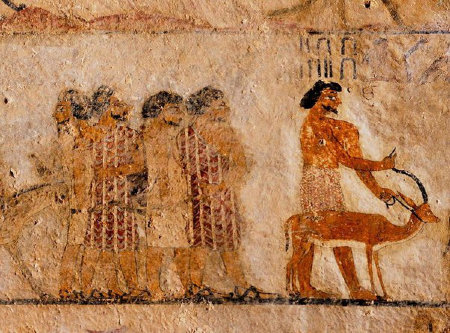We ask you, humbly: don't scroll away.
Hi readers, it seems you use Catholic Online a lot; that's great! It's a little awkward to ask, but we need your help. If you have already donated, we sincerely thank you. We're not salespeople, but we depend on donations averaging $14.76 and fewer than 1% of readers give. If you donate just $5.00, the price of your coffee, Catholic Online School could keep thriving. Thank you.Help Now >
St. Ambrose
Facts
Patron: of Beekeepers, beggars, learners, Milan
Birth: 340
Death: 397
Author and Publisher - Catholic Online
Printable PDF of St. Ambrose
Shop St. Ambrose

Saint Ambrose, also known as Aurelius Ambrosius, is one of the four original doctors of the Church. He was the Bishop of Milan and became one of the most important theological figure of the 4th century.
Ambrose was born around 340 AD to a Roman Christian family. He grew up with his siblings, Satyrus and Marcellina, in Trier, Belgic Gaul (present-day Germany). It is believed by many that when Ambrose was just an infant, a swarm of bees landed on his face and left behind a drop of honey. To his father, this was a sign that Ambrose would become someone great with a wonderful sense for speaking.
After Ambrose's father passed away, he was educated in Rome, where he studied law, literature and rhetoric. Ambrose received a place on the council, like his father, and was made consular prefect, or the Governor, of Liguria and Emilia around 372. Ambrose?s headquarters were in Milan, the then second capital of Italy.
Ambrose remained Governor until 374 when he became the Bishop of Milan. After the former Bishop of Milan died, Ambrose attended the election to prevent any uproars between the Nicene Church and the Arians. While giving an address, the assembly began calling for him to become the next bishop.
Ambrose was known for his Nicene beliefs, but Arians also favored him because he had previously shown charity in theological matters. However, being neither baptized or trained in theology, Ambrose refused to become the next bishop.
He ran and attempted to hide, but his colleague gave him up. Within a week's time, Ambrose was baptized, ordained and duly consecrated bishop of Milan on December 7, 374.
As bishop, he donated all of his land and gave his money to the poor. This made him widely popular and often times more politically powerful than even the emperor.
He studied theology with Simplician, a presbyter of Rome. Using his new education, along with his knowledge of Greek, he took the time to study the Old Testament and Greek authors. He used all of this while preaching; his abilities impressed Augustine of Hippo, who previously thought poorly of Christian preachers.
After meeting Ambrose, Augustine reevaluated himself and was forever changed. In 387, Ambrose baptized Augustine, who he had a great influence on. St. Monica, Augustine's mother, loved Ambrose "as an angel of God who uprooted her son from his former ways and led him to his convictions of Christ."
According to legend, Ambrose tried to put an end to Arianism in Milan. He often attempted to theologically dispute their propositions. The Arians appealed to many high position leaders, but Ambrose was able to stay one step ahead. The Arians increasing strength proved troublesome for Ambrose. Around 386, the Emperor Valentinian II and his mother, Justine, along with many other people, including clergy, laypersons, and military, professed Arianism.
They demanded some of the churches in Milan be dedicated to them, one in the city and one in the suburbs. Ambrose refused and was ordered to appear in front of the council, where he then spoke eloquently in defense of the Church. He is quoted with stating: If you demand my person, I am ready to submit: carry me to prison or to death, I will not resist; but I will never betray the church of Christ. I will not call upon the people to succour me; I will die at the foot of the altar rather than desert it. The tumult of the people I will not encourage: but God alone can appease it.
The imperial court did not like Ambrose's religious principles, but he was sought out to help and speak to Magnus Maximus to prevent him from descending upon Italy. Ambrose was successful.
During a second attempt, the embassy was not successful and Milan was taken. Justine and Valentinian II fled, but Ambrose stayed. He is credited with doing a great service to the sufferers during this time.
In 385, Ambrose once again refused handing over the Portian basilica to Valentinian II, this time to be used by Arian troops. A year later, Ambrose was again ordered to hand over the church for Arian use. Ambrose and his congregation barricaded themselves within the church walls until the imperial order rescinded.
After Theodosius I, emperor of the East, married Justine, Ambrose had him excommunicated for the massacre of 7,000 people. The emperor did several months? worth of public penance.
In his later years, Ambrose retired in Bologna and assisted in the transferring of saints Vitalis and Agricola's relics.
Two years after Theodosius died, after he acquired the possession of the Roman empire, Ambrose passed away on April 4, 397. He was succeeded as bishop of Milan by Simplician.
Ambrose's body remains in the church of St. Ambrogio in Milan, along with the bodies of Saints Gervase and Protase.
St. Ambrose was generous to the poor. He considered them not a group of outsiders, but rather those of the united people. To him, giving to the poor was just a repayment of God's resources, which were intended for everyone equally.
He introduced reforms in the order and manner of public worship. He was known for his "liturgical flexibility that kept in mind that liturgy was a tool to serve people in worshiping God, and ought not to become a rigid entity that is invariable from place to place."
Ambrose is credited with advising Augustine of Hippo to follow local liturgical customs. "When I am at Rome, I fast on a Saturday; when I am at Milan, I do not. Follow the custom of the church where you are," he stated. This advice remains today, and is translated in English as the saying, "When in Rome, do as the Romans do."
Some believe Ambrose was a Christian Universalist, based on interpretations of his writing. The Theological treatises of Ambrose had great influences on Popes Damasus, Siricius and Leo XIII. Ambrose studied largely on the virginity of Mary and her role as Mother of God. He viewed celibacy as superior to marriage and saw Mary as virginity's model.
Ambrose authored many of the Church's important writings and hymns. He is credited with composing the repertory Ambrosian chant, also known as the Antiphonal Chant. He is also credited with composing the hymn "Te Deum," which is believed to have been written when he baptized Augustine of Hippo.
St. Ambrose is the Confessor and Doctor of the Church. He is the patron saint of bee keepers, beggars, learning and Milan, and his feast day is celebrated on December 7.
Join the Movement
When you sign up below, you don't just join an email list - you're joining an entire movement for Free world class Catholic education.
-

-
Mysteries of the Rosary
-
St. Faustina Kowalska
-
Litany of the Blessed Virgin Mary
-
Saint of the Day for Wednesday, Oct 4th, 2023
-
Popular Saints
-
St. Francis of Assisi
-
Bible
-
Female / Women Saints
-
7 Morning Prayers you need to get your day started with God
-
Litany of the Blessed Virgin Mary
Biblical Lost Alphabet Traced Back to Ancient Canaanite Civilization
-

What are the Health Benefits of Grass-Fed Beef for Your Body and Mind?
-

Rise Above Poverty is Empowering Children and Families Through Education and Compassion
-
Artists and Leaders Rally to Preserve the Traditional Latin Mass
-
Republicans Demand Answers Over Army Training Slide Labeling Pro-Life Groups as Terrorist Threats
Daily Catholic
 Daily Readings for Wednesday, July 24, 2024
Daily Readings for Wednesday, July 24, 2024 St. John Boste: Saint of the Day for Wednesday, July 24, 2024
St. John Boste: Saint of the Day for Wednesday, July 24, 2024 Prayer for Travelers: Prayer of the Day for Wednesday, July 24, 2024
Prayer for Travelers: Prayer of the Day for Wednesday, July 24, 2024- Daily Readings for Tuesday, July 23, 2024
- St. Bridget of Sweden: Saint of the Day for Tuesday, July 23, 2024
- A Child's Prayer to Mary: Prayer of the Day for Tuesday, July 23, 2024
![]()
Copyright 2024 Catholic Online. All materials contained on this site, whether written, audible or visual are the exclusive property of Catholic Online and are protected under U.S. and International copyright laws, © Copyright 2024 Catholic Online. Any unauthorized use, without prior written consent of Catholic Online is strictly forbidden and prohibited.
Catholic Online is a Project of Your Catholic Voice Foundation, a Not-for-Profit Corporation. Your Catholic Voice Foundation has been granted a recognition of tax exemption under Section 501(c)(3) of the Internal Revenue Code. Federal Tax Identification Number: 81-0596847. Your gift is tax-deductible as allowed by law.













 Daily Readings for Wednesday, July 24, 2024
Daily Readings for Wednesday, July 24, 2024 St. John Boste: Saint of the Day for Wednesday, July 24, 2024
St. John Boste: Saint of the Day for Wednesday, July 24, 2024 Prayer for Travelers: Prayer of the Day for Wednesday, July 24, 2024
Prayer for Travelers: Prayer of the Day for Wednesday, July 24, 2024

